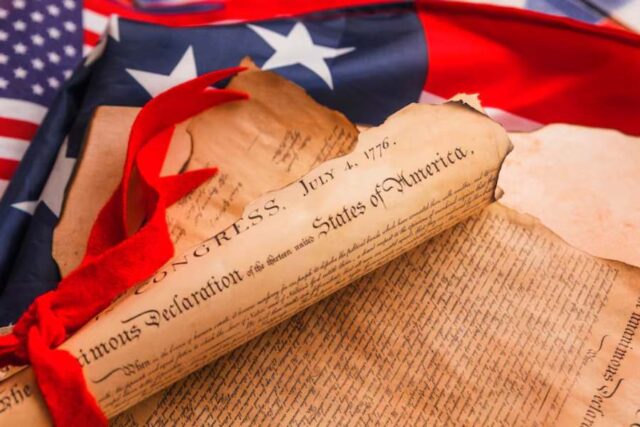When reading about the foundation of the United States, the term “popular sovereignty” appears frequently. But what is popular sovereignty in the Constitution, and why should it matter to everyday citizens, especially parents guiding their children’s understanding of civics? At its core, this principle asserts that the power of the government originates from the people. It’s a foundational idea woven into the fabric of American democracy.
Understanding this principle clarifies how the U.S. government functions and highlights our role in influencing it. In a world where civic literacy is often overlooked, knowing what popular sovereignty is in the Constitution can empower families to teach their children the value of participation, representation, and responsibility. In this article, we’ll break down this concept in simple terms, connect it to real-life examples, and explain why it’s a key part of the Constitution that affects everyone.
What is popular sovereignty in the Constitution?
It means that the people create and sustain the government’s authority. Citizens elect leaders and influence laws, showing that ultimate power lies with the people, not kings, elites, or a ruling class.
The Origins of Popular Sovereignty
Popular sovereignty, while central to the U.S. Constitution, has roots long before America’s founding. The concept emerged through centuries of political thought and debate, evolving from early democratic practices in ancient Rome to more structured philosophical theories during the Enlightenment.
Thinkers such as John Locke and Jean-Jacques Rousseau argued that actual government legitimacy depends on the consent of the governed—a belief that profoundly influenced the Founding Fathers. When drafting the Constitution, the Framers deliberately wove this principle into its structure to establish a system where people, not monarchs or elites, hold the ultimate authority.
This foundational idea is echoed in the Federalist Papers, especially in the writings of James Madison, who emphasized that representative democracy works only when elected officials derive their power from the people. Thus, popular sovereignty became more than a theory; it became a working mechanism for American governance and citizen influence.
How the Constitution Embodies Popular Sovereignty
The U.S. Constitution is more than a framework for government—it’s a reflection of the people’s power. Through its structure and principles, it places authority firmly in the hands of its citizens.
The Preamble and Its Meaning
The U.S. Constitution embodies popular sovereignty with its opening words: “We the People.” This powerful phrase is more than a poetic introduction—it is a direct declaration that the federal government’s authority originates from the citizens themselves. It reinforces the idea that the government is not imposed upon the people but created by them for their benefit.
The Electoral Process
One of the most tangible ways popular sovereignty is expressed is through the electoral process. The Constitution grants citizens the right to vote for representatives, senators, and the president, giving the people direct influence over the country’s leadership and direction. This system ensures that those in power remain accountable to the public, maintaining the democratic foundation envisioned by the Founding Fathers.
Checks and Balances
The system of checks and balances further supports popular sovereignty by preventing any single branch of government from becoming too powerful. Legislative, executive, and judicial powers are distributed and monitored, ensuring decisions reflect the will of the people rather than the interests of a ruling few.
Amendments and Citizen Involvement
Finally, the Constitution’s amendment process reinforces its living nature. It allows citizens and their representatives to make changes over time, reflecting societal growth and the evolving voice of the people.
Why Popular Sovereignty Matters Today
Popular sovereignty is not a historical footnote—it remains a vital, guiding force in modern American democracy. As political landscapes shift and challenges such as misinformation, low voter engagement, and public distrust in institutions rise, understanding popular sovereignty in the Constitution is more crucial than ever. It reinforces that power ultimately belongs to the people, not political elites or unelected officials.
Today, popular sovereignty helps preserve democratic values and ensures the government stays responsive to the needs of its citizens. This principle empowers individuals and communities to create lasting change when embraced and practiced. Here’s why it still matters:
- Encourages civic responsibility: Reminds individuals to participate in government and policy decisions.
- Empowers communities: Gives people the authority to demand transparency and hold leaders accountable.
- Promotes lawmaking participation: Reinforces the idea that laws should reflect the people’s will.
- Increases voter turnout: Highlights the importance of every vote in shaping outcomes.
- Supports social justice: Strengthens the voices behind movements advocating equality and reform.
- Fuels advocacy and activism: Provides a constitutional foundation for protest and policy change.
Real-World Examples of Popular Sovereignty in Action
Popular sovereignty isn’t just a theory written into the Constitution—it’s a principle that plays out in real life across communities and states daily. Putting power in the hands of the people allows citizens to shape their government, laws, and future actively. Here are four powerful examples that show popular sovereignty in action today:
- Local Elections: School board elections, city council races, and mayoral votes allow individuals to directly influence decisions that affect their daily lives. These elections demonstrate how people shape education, infrastructure, safety, and more through the power of their vote.
- Referendums and Ballot Initiatives: Many states allow citizens to vote on specific laws or constitutional amendments through referendums. This form of direct democracy puts legislative power directly into the people’s hands.
- The Civil Rights Movement: This historic movement exemplified popular sovereignty in its purest form. Through protests, organizing, and advocacy, citizens demanded that their voices be heard and that government policies reflect equality and justice.
- Recent Voter Mobilizations: Increased efforts to register voters in underrepresented communities have revitalized engagement and reinforced the idea that every vote counts in shaping the nation’s direction.
Common Misunderstandings About Popular Sovereignty
Everyone votes on every issue
A widespread misunderstanding is that popular sovereignty means every citizen votes directly on all laws and decisions. In truth, the United States follows a representative democracy. Citizens elect leaders who make choices on their behalf, ensuring that governance remains practical while still grounded in the people’s authority.
Popular sovereignty gives people unlimited power
Some believe popular sovereignty allows citizens total, unrestricted control over government decisions. However, the Constitution includes essential checks and balances. These legal safeguards prevent abuse of power, protect minority rights, and ensure that all changes occur within a structured framework.
Only elections matter in popular sovereignty
While voting is central to the concept, it’s not the only form. Protests, petitions, public forums, and advocacy campaigns are powerful expressions of people’s voices. These forms of engagement often influence policy and bring attention to issues that may not appear on a ballot.
Popular sovereignty applies only at the federal level
Another standard error is thinking this principle is limited to national politics. Popular sovereignty is also active in state and local governments, where citizens regularly shape laws and policies through local elections and initiatives.
Conclusion
The foundation of a strong democracy lies in the hands of its people. Popular sovereignty, as the Constitution outlines, empowers every citizen to influence laws, elect leaders, and shape the future. It’s not just a historical concept—it’s a living principle that thrives through active participation. Whether you’re voting, attending local meetings, or teaching your children about civic duties, you’re contributing to the health of our democratic system. Parents especially play a vital role in raising informed, engaged citizens. The phrase “We the People” isn’t symbolic—it’s a reminder that absolute power begins with us. Staying informed and involved ensures that freedom, representation, and justice remain cornerstones of American life for generations.
FAQ’s
What does popular sovereignty mean in simple terms?
Popular sovereignty means the people hold the ultimate power. Citizens elect leaders, shape laws, and hold the government accountable through participation.
How is popular sovereignty shown in the Constitution?
It appears in the Preamble with “We the People,” and is reinforced through voting rights, amendments, and structures that allow citizen-driven change.
Why is popular sovereignty important for kids to learn?
Learning this helps children understand how democracy works, builds responsibility, and prepares them to be informed and active future voters.
Can popular sovereignty be taken away?
Constitutional safeguards protect it in democratic nations like the U.S.; however, in undemocratic regimes, it can be suppressed or entirely removed.
How often does popular sovereignty affect our lives?
It influences our daily lives—whether through local laws, elections, or policy decisions—citizens have a say in the country’s direction.
Is popular sovereignty unique to the U.S.?
While the U.S. strongly emphasizes it in its Constitution, many democratic countries also follow this principle as a foundation of their governance.














